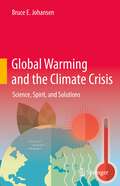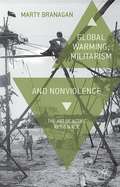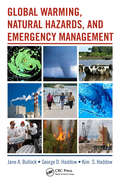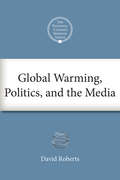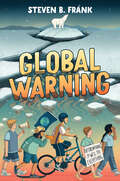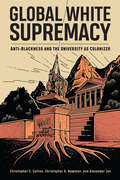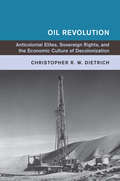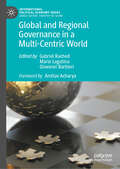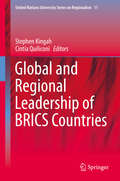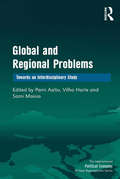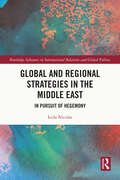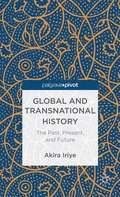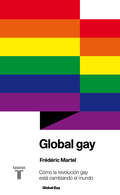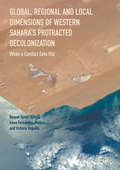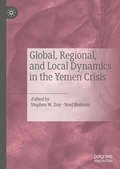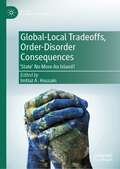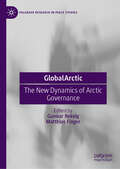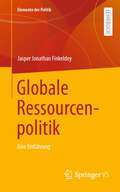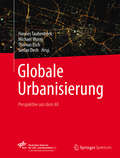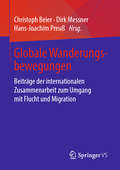- Table View
- List View
Global Warming and the Climate Crisis: Science, Spirit, and Solutions
by Bruce E. JohansenThis textbook introduces readers to basic scientific principles of climate change. Based on extensive empirical evidence, it explains weather events that indicate climate change’s evolution and presents important topics connected to climate change, such as political controversies, climate policy, as well as Native American perspectives. Finally, it presents attempted solutions, including policy recommendations and technological proposals for necessary changes in our world.Providing a well-written and easy-to-follow overview of knowledge of science-based geophysical facts, including thermodynamics, the book puts a strong emphasis on why expeditious action on global warming is urgent. The book also explains why smart greenhouse-gas reduction strategies will ignite economic growth, generate new domestic jobs, protect public health, and strengthen energy security.Not assuming a scientific background on the part of the reader, Global Warming and the Climate Crisis: Science, Spirit, and Solutions offers an ideal supplemental reading in many types of courses in Earth sciences, climate policy, climate change sciences, as well as politics of climate change, from high school through undergraduate. General readers also will benefit from its treatment of this very important and timely issue.
Global Warming, Militarism and Nonviolence
by Marty BranaganMilitarism is the elephant in the room of global warming. Of all government sectors, 'Defence' has the highest carbon footprint and expenditure, yet has largely been exempt from international scrutiny and regulation. Marty Branagan uses Australian and international case studies to show that nonviolence is a viable alternative to militarism for national defence and regime change. 'Active resistance', initiated in Australian environmental blockades and now adopted globally, makes the song 'We Shall Not Be Moved' much more realistic, as activists erect tripod villages, bury, chain and cement themselves into the ground, and 'lock-on' to machinery and gates. Active resistance, 'artistic activism', and use of new information and communication technologies in movements such as the Arab Spring and 'Occupy' demonstrate that nonviolence is an effective, evolving praxis.
Global Warming, Natural Hazards, and Emergency Management
by Jane A. Bullock George D. Haddow Kim S. HaddowScientists predict the earth is facing 40-to-60 years of climate change, even if emissions of carbon dioxide and other global warming gases stopped today. One inevitable consequence of the greenhouse gases already in the atmosphere will be an increase in the frequency and severity of natural disaster events. Global Warming, Natural Hazards, and Eme
Global Warming, Politics, and the Media
by David Roberts Eban GoodsteinOn September 21, 2011, David Roberts participated in The National Climate Seminar, a series of webinars sponsored by Bard College's Center for Environmental Policy. The online seminars provide a forum for leading scientists, writers, and other experts to talk about critical issues regarding climate change. The series also opens a public conversation, inviting participants to ask questions and contribute their own thoughts. Roberts is a Senior Staff Writer at Grist, one of the web's most popular sites for environmental news and commentary, so he is distinctively qualified to discuss the relationship between global warming, politics, and the media. In his lecture, Roberts argued that environmentalists' traditional criticism of climate change coverage--namely that journalists describe global warming as a debatable theory rather than as fact--is no longer the issue. Most media accept the reality of climate change--but it is treated as a specialty issue, rather than as a phenomenon that affects myriad aspects of life. The seminar focused on how to change that perception--how to make climate a backdrop to the political debates that affect real change. This E-ssentialis an edited version of Roberts' talk and the subsequent question and answer session. While some material has been cut and some language modified for clarity, the intention was to retain the substance of the original discussion.
Global Warning
by Steven B. FrankA group of 12-year-old friends concerned about climate change proposes a new way to save the earth: amending the U.S. Constitution. Their project propels these activists on an amazing journey across America—and all the way to Norway—with plenty of outside-the-box hijinks and civil disobedience, as they work to save the planet and their futures on it. For sixth grader Sam Warren and his friends Catalina, Alistair, Jaesang, and Zoe, the effects of climate change are too pressing to ignore. Adults don’t seem to be up to the challenge of taking action to make real change, but kids know it’s their futures on the line. If their parents, teachers, and government officials won’t step up well, then, they will! And these young people will stop at nothing to save the planet and their futures on it. With a little help from a retired kids' rights lawyer and a grandma who knows how to march, they are ready to think big: Constitutional amendment big. But can a bunch of 12-year-olds really draft an amendment that protects the planet, get it to pass in Congress, and change enough hearts and minds across the country to get it ratified before the clock runs out? Steven B. Frank crafts another funny and fast-paced story of heightened-reality wish-fulfillment, loaded with the witty patter of smart kids, in this book that reads like Aaron Sorkin for middle grade and plumbs the complexities of the Constitution and the critical turning point of global climate change.
Global White Supremacy: Anti-Blackness and the University as Colonizer
by Christopher S. Collins Alexander Jun Christopher B. NewmanKnowledge is more expansive than the boundaries of the Western university model and its claim to be the dominant—or only—rigorous house of knowledge. In the former colonies of Europe (e.g., South Africa, Brazil, and Oceania), the curriculum, statues, architectures, and other aspects of the university demonstrate the way in which it is a fixture in empire maintenance. The trajectory of global White supremacy is deeply historical and contemporary—it is a global, transnational, and imperial phenomenon. White supremacy is sustained through the construction of inferiority and anti-Blackness. The context, history, and perspective offered by Collins, Newman, and Jun should serve as an introduction to the disruption of the ways in which university and academic dispositions have and continue to serve as sites of colonial and White supremacist preservation—as well as sites of resistance.
Global and International History: Anti-Imperial Metropolis
by Michael GoebelThis book traces the spread of a global anti-imperialism from the vantage point of Paris between the two World Wars, where countless future leaders of Third World countries spent formative stints. Exploring the local social context in which these emergent activists moved, the study delves into assassination plots allegedly hatched by Chinese students, demonstrations by Latin American nationalists, and the everyday lives of Algerian, Senegalese and Vietnamese workers. On the basis of police reports and other primary sources, the book foregrounds the role of migration and interaction as driving forces enabling challenges to the imperial world order, weaving together the stories of peoples of three continents. Drawing on the scholarship of twentieth-century imperial, international and global history as well as migration, race and ethnicity in France, it ultimately proposes a new understanding of the roots of the Third World idea.
Global and International History: Anticolonial Elites, Sovereign Rights, and the Economic Culture of Decolonization (Global and International History)
by Dietrich Christopher R. W.Through innovative and expansive research, Oil Revolution analyzes the tensions faced and networks created by anti-colonial oil elites during the age of decolonization following World War II. This new community of elites stretched across Iran, Iraq, Saudi Arabia, Venezuela, Algeria, and Libya. First through their western educations and then in the United Nations, the Arab League, and the Organization of Petroleum Exporting Countries, these elites transformed the global oil industry. Their transnational work began in the early 1950s and culminated in the 1973–4 energy crisis and in the 1974 declaration of a New International Economic Order in the United Nations. Christopher R. W. Dietrich examines how these elites brokered and balanced their ambitions via access to oil, the most important natural resource of the modern era.
Global and International History: Humanitarian Invasion
by Timothy NunanHumanitarian Invasion is the first book of its kind: a ground-level inside account of what development and humanitarianism meant for Afghanistan, a country touched by international aid like no other. Relying on Soviet, Western, and NGO archives, interviews with Soviet advisers and NGO workers, and Afghan sources, Timothy Nunan forges a vivid account of the impact of development on a country on the front lines of the Cold War. Nunan argues that Afghanistan functioned as a laboratory for the future of the Third World nation-state. If, in the 1960s, Soviets, Americans, and Germans sought to make a territorial national economy for Afghanistan, later, under military occupation, Soviet nation-builders, French and Swedish humanitarians, and Pakistani-supported guerrillas fought a transnational civil war over Afghan statehood. Covering the entire period from the Cold War to Taliban rule, Humanitarian Invasion signals the beginning of a new stage in the writing of international history.
Global and International History: Of Limits and Growth
by Stephen J. MacekuraOf Limits and Growth connects three of the most important aspects of the twentieth century: decolonization, the rise of environmentalism, and the United States' support for economic development and modernization in the Third World. It links these trends by revealing how environmental NGOs challenged and reformed the development approaches of the US government, World Bank, and United Nations from the 1960s through the 1990s. The book shows how NGOs promoted the use of 'appropriate' technologies, environmental reviews in the lending process, development plans based on ecological principles, and international cooperation on global issues such as climate change. It also reveals that the 'sustainable development' concept emerged from transnational negotiations in which environmentalists accommodated the developmental aspirations of Third World intellectuals and leaders. In sum, Of Limits and Growth offers a new history of sustainability by elucidating the global origins of environmental activism, the ways in which environmental activists challenged development approaches worldwide, and how environmental non-state actors reshaped the United States' and World Bank's development policies.
Global and Regional Governance in a Multi-Centric World (International Political Economy Series)
by Maria Lagutina Gabriel Rached Giovanni BarbieriIn a world shaken by constant crises and shifting power dynamics, Global and Regional Governance in a Multicentric World delves into the core of the global governance system, exploring its flaws, its evolution, and the forces seeking to reshape it. As the Western-crafted liberal order faces unprecedented scrutiny, this book provides a timely analysis of how emerging powers - China, Brazil, India, South Africa, and others - are challenging traditional governance models, proposing alternatives that better reflect their values, interests, and aspirations. From Asia to Africa, Latin America to Eurasia, this book examines how these regions, collectively known as “the Rest” or “the Global South,” are responding to the shortcomings of a global system long dominated by Western interests. Through insightful regional studies, the authors highlight how “rising powers” are no longer willing to remain peripheral players; instead, they are pushing for a more inclusive, representative, and effective global framework. Rooted in the latest international relations trends, this book offers an incisive exploration of new governance models emerging in a “multi-centric” world. It raises pressing questions about global stability as follows: Will these rising powers succeed in transforming the global order? How do they envision international cooperation? Can their ideas coexist with established Western powers? Through this work, readers gain a nuanced understanding of the forces shaping tomorrow’s world and the potential pathways for reform. Ideal for scholars, policymakers, and those with a keen interest in world affairs, Global and Regional Governance in a Multicentric World is a compelling call to rethink contemporary global governance and the possible paths of the international agenda in an era where traditional multilateralism is no longer able neither sufficient to address the pressing challenges from our interconnected world.
Global and Regional Leadership of BRICS Countries
by Stephen Kingah Cintia QuiliconiThis book presents a systematic collation of the regional and global dimensions of the leadership role of BRICS countries (Brazil, Russia, India, China and South Africa). It analyses the rising regional and global leadership of BRICS, using specific benchmarks to gauge the nature of this leadership. The elements examined include willingness to lead, the capacity to do as much, and the degree to which the given actor is accepted as a leader both within and beyond its region. The chapters in the book capture the nature of trends in regional and global leadership within the contexts of a changing international order. It is taken for granted that Brazil, Russia, India, China and South Africa are now engineering a unique pool of governance that is seeking alternatives to the current order of global economic and political affairs. The fact that these countries have jointly decided to forge ahead with the BRICS constellation of states that is now taking consequential decisions such as the creation of the BRICS' New Development Bank, is not to be treated lightly. In this book the majority of papers take a step back and systematically analyse the real state of the leadership that is provided by the BRICS on a litany of regionally and globally relevant issues. While no one doubts the fact that these countries have the capacity to provide leadership especially in their various regions on many issues, what remains moot is whether they are willing and capable to do so at the global level. Even in those cases where there is the willingness and capacity, the book argues that the acceptance of such leadership by potential followers is not always a given.
Global and Regional Problems: Towards an Interdisciplinary Study (The International Political Economy of New Regionalisms Series)
by Vilho HarleDistinctive due to explicit and systematically developed links between international relations (IR) and related disciplines, this book addresses global and regional interactions and the complex policy problems that often characterise this agenda. Such enhanced communication is crucial for improving the capacity of IR to engage with concrete issues that today are of high policy relevance for international organisations, states, diplomats, mediators and humankind in general. Whilst the authors do not reject the present IR, they offer a wider research agenda with new directions intended not only for those IR scholars who are unsatisfied with the analytical power of the current discipline, but also for those working on 'international', 'foreign', 'global' or 'interregional' issues in other disciplines and fields of research. In this instance they pay particular attention to linking up with peace research, international political economy (IPE) and cultural political economy (CPE), sociology, political geography, development studies, linguistics, cultural studies, environmental studies and energy research, gender studies, and traditions of area studies.
Global and Regional Strategies in the Middle East: In Pursuit of Hegemony (ISSN)
by Leila NicolasGlobal and Regional Strategies in the Middle East explores hegemony in the Middle East through understanding different dimensions of power politics and the consequences of the hegemonic ambitions of both global and regional powers.The book adds new aspects to the extensive literature on grand strategies in the Middle East by exploring and evaluating competing strategies from an "insider" perspective. First, it highlights the main determinants of Global powers' grand strategies, assesses the ones applied in the Middle East, and forecasts future strategies after the Ukraine war in alignment with other rival states' capabilities and goals. It then underlines regional dynamics and the hegemonic quest of regional powers and their power politics' determinants since the "War on terror," the Arab Spring, and, more recently, the Russian intervention in Ukraine and Israel-Gaza conflict. The book broadens readers' perspectives by clarifying the region's dynamics that shaped the global and regional power rivalries, where security concerns, economic interests, oil supplies, and hegemonic ambitions make it complicated for the US to keep influence and the total control it had during the late 20th century.This book will be of great interest to scholars and students of the MENA region, International Relations and Strategic Studies.
Global and Transnational History
by Akira IriyeIt is no exaggeration to say that the study of history has been transformed significantly during the last twenty-odd years. Akira Iriye, the world authority on transnational history, examines the emergence and growth of global and transnational history, away from more traditional, nation-centred perspectives.
Global gay
by Frédéric MartelUna investigación sin precedentes alrededor del mundo sobre la cuestión gay. De una esquina a otra del planeta, la revolución gay está en marcha. De la resistencia contra la represión en China, Cuba o Irán al activismo a favor del matrimonio para parejas del mismo sexo en Estados Unidos y en Europa. De lo underground al mainstream. De la criminalización de la homosexualidad a la criminalización de la homofobia. Durante cinco años Frédéric Martel ha llevado a cabo un estudio sin precedentes en cuarenta y cinco países, desde los más abiertos a los más hostiles, reuniéndose con centenares de actores de esta revolución. A través de ese novedoso prisma, este libro dibuja una verdadera geopolítica de la globalización gay analizando los cambios en los modos de vida, la redefinición del matrimonio, la emancipación paralela de las mujeres y los homosexuales o el impacto decisivo que han supuesto Internet y las redes sociales. Aunque se desarrollen bajo una misma bandera, las singularidades de la vida local y la ausencia de homogeneidad de las comunidades gays de todo el mundo son fascinantes. Martel descubre que la globalización no se traduce necesariamente en uniformización: la diversidad es infinita. Como termómetro de la evolución de las mentalidades, la cuestión gay se ha convertido en un valioso criterio para juzgar el estado de una democracia y la modernidad de un país. Este libro, rico en retratos y testimonios sorprendentes, cuenta este nuevo frente en el que ahora se libra la batalla por los derechos del hombre. Reseñas:«Libro-investigación que se lee como una historia que cuenta la nueva batalla de los derechos humanos.»Slate «La homosexualidad presenta mil caras distintas en todo el mundo y este formidable ensayo sociológico sobre la revolución gay firmado por Frédéric Martel ofrece una síntesis esclarecedora.»Le Point «Cuando Frédéric Martel dice que se ha propuesto averiguar cómo funciona un fenómeno de masas, va en serio. Quiere decir que va a pasar años viajando por una cincuentena de países de todo el mundo, que va a entrevistar a miles de personajes pequeños y grandes y va a escribir un libro con conclusiones a las que pocos hemos llegado antes.»ICON
Global politics in the 21st century
by Robert J. JacksonObjective, critical, optimistic, and with a global focus, this textbook combines international relations theory, history, up-to-date research, and current affairs to give students a comprehensive, unbiased understanding of international politics. It integrates theory and traditional approaches with globalization and research on such topics as terrorism, new economic superpowers, and global communications and social networking to offer unusual breadth and depth for an undergraduate course. The text is enhanced by box features and 'Close Up' sections with context and further information; 'Critical Case Studies' highlighting controversial and complex current affairs that show how the world works in practice; and questions to stimulate discussion, review key concepts, and encourage further study. Unlike any other textbook, Global Politics in the 21st Century demonstrates the significance and interconnectivity of globalization and new security challenges in the twenty-first century and illuminates the role of leadership in transnational crises.
Global, Regional and Local Dimensions of Western Sahara’s Protracted Decolonization
by Raquel Ojeda-Garcia Irene Fernández-Molina Victoria VeguillaThis book explores the traces of the passage of time on the protracted and intractable conflict of Western Sahara. The authors offer a multilevel analysis of recent developments from the global to the local scenes, including the collapse of the architecture of the UN-led conflict resolution process, the advent of the War on Terror to the the Sahara-Sahel area and the impact of the 'Arab Spring' and growing regional security instability. Special attention is devoted to changes in the Western Sahara territory annexed by Morocco and the Sahrawi refugee camps in Algeria. Morocco has adapted its governance and public policies to profound socio-demographic transformations in the territory under its control and has attempted to obtain international recognition for this annexation by proposing an Autonomy Plan. The Polisario Front and Sahrawi nationalists have shifted their strategy and pushed the centre of gravity of the conflict back inwards by focusing on pro-independence activism inside the disputed territory.
Global, Regional, and Local Dynamics in the Yemen Crisis
by Stephen W. Day Noel BrehonyThis international relations study investigates the underlying causes of the Yemen crisis by analyzing the interactions of global, regional, and local actors. At all phases, GCC member states played a key role, from political negotiations amidst street protests in 2011 to formation of an international military coalition in 2015. Using a multi-actor model, the book shows that various actors, whether state or non-state, foreign or domestic, combined to create a disastrous armed conflict and humanitarian crisis. Yemen’s tragedy is often blamed on Saudi Arabia and its rivalry with Iran, which is usually defined in sectarian “Sunni-Shia” terms, yet the book presents a more complex picture of what happened due to involvement by many other foreign actors, such as the UAE, UN, UK, US, EU, Russia, China, Turkey, Oman, Qatar, and African states of the Red Sea and Horn of Africa.
Global-Local Tradeoffs, Order-Disorder Consequences: 'State' No More An Island? (Global Political Transitions)
by Imtiaz A. HussainIn this book, ten substantive chapters examine how collisions between technological developments (globalizing forces) and thickening populist pressures (localizing dynamics) constantly keep reinventing the state in unforeseen and unpredictable ways. We learn of how international organizations have fared, and to what extent grass-roots grumbles have impacted big-picture developments in quite diverse parts of the world. Just placing unfolding crises under the microscope cannot but generate policy-solving observations. Treated in corresponding order, these crises revolve around adjusting international institutions; absorbing current populist outbursts; shifting from peacekeeping to peacemaking; spying in the global south; absorbing displaced persons; Rwandan land reform; pandemic and RMG readjustments; Bangladesh’s democratic transition; Rohingyan-Syrian refugees; and Mexico’s 1990s liberalization. Though overarching, observations in the book accent state strength battling with state porosity; the downward spiraling of global order; and the simple lack of any controlling mechanism against globalizing/localizing dynamics in the trenches of everyday life being matched by continued uncertainty on the analytical plane.
GlobalArctic: The New Dynamics of Arctic Governance (Palgrave Research in Peace Studies)
by Matthias Finger Gunnar RekvigThe third volume in the Global Arctic series examines the transformation of Arctic governance following the 2022 outbreak of war in Ukraine. This conflict has disrupted the post-Cold War cooperative circumpolar order, upending decades of multilateral collaborations. The book traces the Arctic's evolution from Cold War great power competition to a focus on human security and cooperation, highlighting the Arctic Council's establishment and the growth of the "Arctic family" with non-Arctic actors. It explores how climate change became a key driver for Arctic (re)engagement, opening new opportunities and challenges. The 2022 invasion of Ukraine has dramatically altered this landscape, ending the post-Cold War era of collaboration and ushering in the post-post-Cold War era, raising critical questions about regional cooperation, climate change mitigation, and global security. This book brings together diverse expert perspectives to analyze the rapidly changing geopolitical dynamics of the Arctic. It explores the tension between collaboration needs and resurgent great power competition, offering valuable insights for policymakers, scholars, and students. As global power dynamics shift and climate change threatens, understanding Arctic governance challenges becomes imperative. This book serves as an essential resource for navigating the complex Arctic political landscape and examining how new divisions are reshaping the region's future.
Globale Ressourcenpolitik: Eine Einführung (Elemente der Politik)
by Jasper Jonathan FinkeldeyDieses Lehrbuch setzt sich mit den zentralen Institutionen, Akteuren und politischen Prozessen um die globale Verteilung und Nutzung kritischer natürlicher Ressourcen auseinander. Einige Stimmen sehen die Welt bereits im Zeitalter der Ressourcenkriege angekommen, andere betonen, dass Ressourcenknappheit auch zu neuen Kooperationen im internationalen System führe. Unter dem Begriff „natürlicher Ressourcen“ werden sowohl nachwachsende (z.B. Getreideprodukte, Holz) sowie nicht-nachwachsende Ressourcen (z.B. Rohöl oder Erdgas) gefasst, deren Verteilung und Nutzung politischen und ökonomischen Prozesse unterliegen.
Globale Urbanisierung
by Stefan Dech Thomas Esch Hannes Taubenböck Michael WurmAuf dem ganzen Erdball drängen die Menschen vom Land in die Städte. Den prognostizierten globalen Bevölkerungszuwachs werden komplett die Städte auffangen. Mit dieser gewaltigen Wanderungsbewegung gehen dramatische Veränderungen der globalen Siedlungslandschaft einher: Neue Millionenstädte entstehen aus dem Nichts, Slums wuchern in jede noch so kleine städtische Freifläche, Megacities fressen sich unaufhaltsam ins Hinterland. Vorstädte erstrecken sich ins Unendliche, Städte verschmelzen miteinander und urbane Zentren wachsen in den Himmel. Stadtlandschaften entstehen in neuen Dimensionen, Strukturen und Mustern. Megaregionen mit mehr als 100 Millionen Einwohnern definieren eine neue urbane Geographie. Die globale Stadt ist dauerhaft im Wandel, dynamischer als jemals zuvor. Erdbeobachtung aus dem All bietet einen einzigartigen Blick auf die Siedlungslandschaften unseres Planeten. Exemplarisch visualisiert das Cover leuchtende Straßenzüge bei Nacht und macht damit die pulsierenden Lebensadern einer Stadt sichtbar. Bisher hatte die Forschung im fernerkundlichen Bereich jedoch überwiegend methodische Entwicklungen im Fokus. Dieses Buch setzt die Ergebnisse der Erdbeobachtung gezielt ein, um raumwissenschaftliche Erkenntnisse zu Fragestellungen im Kontext globaler Urbanisierung zu erlangen. Dabei präsentieren die Autoren Studien zu Städten und Regionen auf allen fünf Kontinenten der Erde, zu großen und kleinen Städten, zu geplanten und ungeplanten, zu alten und neuen, zu armen und reichen, zu erfolgreichen oder gefährdeten. Es zeichnet ein umfassendes Bild globaler Urbanisierungsprozesse und ihrer räumlichen Auswirkungen. Die gebaute Stadt wird ebenso betrachtet und analysiert wie ihre Auswirkungen auf den sie umgebenden Raum und die Rückkopplung mit den in den Städten lebenden Menschen. Urbanisierung ist mehr als die Summe ihrer demographischen, funktionalen oder morphologischen Aspekte. Im Verbund mit anderen wissenschaftlichen Disziplinen eröffnet die Fernerkundung neuartige Perspektiven und Erkenntnisse zu dieser komplexen Thematik.
Globale Urbanisierung: Perspektive aus dem All
by Stefan Dech Thomas Esch Hannes Taubenböck Michael WurmAuf dem ganzen Erdball drängen die Menschen vom Land in die Städte. Den prognostizierten globalen Bevölkerungszuwachs werden komplett die Städte auffangen. Mit dieser gewaltigen Wanderungsbewegung gehen dramatische Veränderungen der globalen Siedlungslandschaft einher: Neue Millionenstädte entstehen aus dem Nichts, Slums wuchern in jede noch so kleine städtische Freifläche, Megacities fressen sich unaufhaltsam ins Hinterland. Vorstädte erstrecken sich ins Unendliche, Städte verschmelzen miteinander und urbane Zentren wachsen in den Himmel. Stadtlandschaften entstehen in neuen Dimensionen, Strukturen und Mustern. Megaregionen mit mehr als 100 Millionen Einwohnern definieren eine neue urbane Geographie. Die globale Stadt ist dauerhaft im Wandel, dynamischer als jemals zuvor. Erdbeobachtung aus dem All bietet einen einzigartigen Blick auf die Siedlungslandschaften unseres Planeten. Exemplarisch visualisiert das Cover leuchtende Straßenzüge bei Nacht und macht damit die pulsierenden Lebensadern einer Stadt sichtbar. Bisher hatte die Forschung im fernerkundlichen Bereich jedoch überwiegend methodische Entwicklungen im Fokus. Dieses Buch setzt die Ergebnisse der Erdbeobachtung gezielt ein, um raumwissenschaftliche Erkenntnisse zu Fragestellungen im Kontext globaler Urbanisierung zu erlangen. Dabei präsentieren die Autoren Studien zu Städten und Regionen auf allen fünf Kontinenten der Erde, zu großen und kleinen Städten, zu geplanten und ungeplanten, zu alten und neuen, zu armen und reichen, zu erfolgreichen oder gefährdeten. Es zeichnet ein umfassendes Bild globaler Urbanisierungsprozesse und ihrer räumlichen Auswirkungen. Die gebaute Stadt wird ebenso betrachtet und analysiert wie ihre Auswirkungen auf den sie umgebenden Raum und die Rückkopplung mit den in den Städten lebenden Menschen. Urbanisierung ist mehr als die Summe ihrer demographischen, funktionalen oder morphologischen Aspekte. Im Verbund mit anderen wissenschaftlichen Disziplinen eröffnet die Fernerkundung neuartige Perspektiven und Erkenntnisse zu dieser komplexen Thematik.
Globale Wanderungsbewegungen: Beiträge der internationalen Zusammenarbeit zum Umgang mit Flucht und Migration
by Christoph Beier Dirk Messner Hans-Joachim PreußNach wie vor sind praktikable Vorschläge für den Umgang mit Flucht und Vertreibung aufgrund von Gewalt, das Management von globalen Wanderungsbewegungen und die Integration von Flüchtlingen und Migranten rar. Dieses Buch wirft vor dem Hintergrund der aktuellen Debatten um den richtigen Umgang mit Flucht und Migration einen Blick auf langfristig wirksame Lösungen. In den verschiedenen Kapiteln beleuchten Fachleute aus Wissenschaft, Politik und Praxis die Ursachen für globale Wanderungsbewegungen und die Konsequenzen von Migration auf politischer, wirtschaftlicher und sozialer Ebene. Dabei stehen nicht die Vermeidung von Wanderungsbewegungen, sondern vor allem die Nutzung positiver Effekte in Herkunfts-, Transit- und Zielländern im Mittelpunkt der Diskussion.Die HerausgeberChristoph Beier ist Leiter des Programms “Good Governance for LocalDevelopment, South Caucasus” mit Sitz in Tiflis, Georgien. Bis 2019 war er stellvertretender Vorstandssprecher der Deutschen Gesellschaft für InternationaleZusammenarbeit (GIZ) GmbH in Eschborn und Bonn.Dirk Messner ist Präsident des Umweltbundesamtes in Dessau. Bis 2019 war erDirektor des Institute for Environment and Human Security an der Universität derVereinten Nationen in Bonn.Hans-Joachim Preuß ist Repräsentant der Friedrich-Ebert-Stiftung in Benin.Zuvor war er bis Juni 2018 Vorstandsmitglied der Deutschen Gesellschaft fürInternationale Zusammenarbeit (GIZ) GmbH in Eschborn und Bonn.
